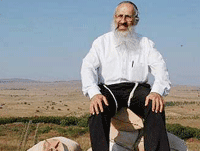Haftarah for Minchah of Yom Kippur
Yonah: The Beloved and Courageous Prophet
by HaRav Shlomo Aviner

Yonah, a prophet of Hashem, received a Divine command to call for a spiritual awakening in Nineveh, the capital of the huge Kingdom of Ashur. We would think that he would be overjoyed: what an amazing opportunity to help an entire empire repent! But his response is the exact opposite.
As is known, three times a day in the prayer “Aleinu” we say: “Therefore we put our hope in You, Hashem, our G-d, that we will quickly see Your mighty splendor…to perfect the world through the Almighty’s kingdom. Then all humanity will call upon Your Name.” Our deepest wish is that all of humanity will find the proper path.
And yet we read: “Yonah arose to flee to Tarshish from before Hashem. He went down to Yafo and found a ship traveling to Tarshish. He paid his fare and boarded it to travel with them to Tarshish from before Hashem” (1:3). The first question which arises is: how can one flee “from before Hashem,” since the earth is full of His honor? “How shall I leave from Your Spirit and where shall I flee from Your Presence?” (Tehillim 139:7). Is it really possible to run away from the Master of the Universe?
The Radak, Rabbi David Kimchi, explained that Yonah knew that one cannot flee from Hashem. This is made clear from the text itself, which does not in fact say that Yonah wanted to flee “from Hashem” but rather that he wanted to flee “from before Hashem” (Yonah 1:3). Yonah sought to distance himself from the place of prophecy, for it is only possible to receive prophecy in the Land of Israel. The Radak said that if he left the Land of Israel, the spirit of prophecy – through which one is considered to be “before Hashem” – would not be able to rest upon him. The Land of Israel is the Land of prophecy. Our Sages were therefore surprised by the verse: “It was that the word of Hashem came to Yechezkel ben Buzi Ha-Cohain in the land of Kasdim” (Yechezkel 1:3).” How did he prophesy outside of the Land? The answer: “It was,” meaning, “it already was” (Moed Katan 25a), i.e. Yechezkel began by prophesying in the Land of Israel and then continued to prophesy in the Exile.
But an additional question arises: How then did Moshe Rabbenu prophesy in the land of Egypt and in the desert? Rabbi Yehudah Halevi provides two answers to this question: 1. It is possible to prophesy not only in the Land of Israel but also about the Land of Israel, even when one is outside of the Land (Kuzari 2, 14). 2. The particular area where Moshe Rabbenu prophesied is part of the Land of Israel. There is a disagreement regarding the southern border of Israel, which is called “the River-bed of Egypt” [Nachal Mitzrayim]. It is unclear whether this refers to the Nile or to Wadi El Arish. According to the opinion of Rabbi Yehudah Halevi “the River-bed of Egypt” is the eastern offshoot of the Nile called “Pelusium” and thus the land of Goshen, where Moshe Rabbenu prophesied, is within the borders of the Land of Israel.
Regardless, Yonah was well aware that Hashem’s glory fills the entire world. Therefore, according to the Radvaz, Rabbi David ben Zimra, who lived in Egypt four hundred years ago, Yonah still had not received the definite words to relate to the people, as it is written: “Call out to her” (1:2). Yes, he had been “called,” but the specifics of that call were as yet lacking. Only after he was spit out of the fish was the exact prophecy revealed to him: “You should arise to Nineveh, the great city, and call out to it the announcement which I tell you” (3:2). The Radvaz brought a proof from Targum Yonatan (the Aramaic translation) which explains the verse, “And Yonah arose to flee to the sea before he prophesied,” i.e. before he received the prophecy (Shut Ha-Radvaz vol. 2 #842).
This brings us back to our original question: What did Yonah see that made him refuse to fulfill the Divine order? Rashi explained that Yonah said: The non-Jews are close to repentance (Yonah 1:3) – i.e. they repent easily. The Nation of Israel, however, is not close to repentance. They are stiff-necked. The Nation of Israel had a myriad of prophets. Our Rabbis relate that there were forty-eight prophets and eight prophetesses, and those were in addition to the hundreds and thousands of prophets who did not leave any writings (Megillah 14a). There were so many prophets, and yet the Nation of Israel did not always heed their call. The non-Jews, in contrast, repent quickly. We see this clearly when Yonah, without exhibiting any desire or passion, arrives to the city and says: “Another forty days, and Nineveh shall be overthrown” (Yonah 3:4). He says the absolute minimum possible, and yet they begin repenting immediately! So Yonah reasoned: if I help the non-Jews repent, the Nation of Israel (who will not heed the call) will be judged harshly. I do not want to be part of this process.
There is, in truth, a very important question here: why do the non-Jews repent so quickly, while we, the treasured and holy Nation, are stiff-necked and do not listen to the prophets? The answer is that the non-Jews repent quickly, but they also return to their old-ways quickly. Their repentance is not whole hearted. It is true that the people of Nineveh repented: the king, the citizens and even the animals fasted and put on sackcloth and ashes. But it is also true that they returned to their sinful ways with the same alacrity. The proof of this is that we have never heard that the city of Nineveh became a city of righteous people. The opposite is true: Nineveh was the capital of Sancheriv, whose men destroyed the Kingdom of Israel and exiled the Ten Tribes who have disappeared to this very day. We have heard that they waged difficult and cruel wars. Their repentance was not sincere or true. In contrast, although the Nation of Israel is stiff-necked, when they do repent, their repentance is true and not merely an act of momentary excitement. The Maharal – Rabbi Yehudah Loew – explained that this character trait flows from the fact that the Nation of Israel examines every matter based on intellect. Because the Nation of Israel argues over every issue and is not easily convinced, it is difficult to get them to repent (Netzach Yisrael, chapter 14). The Nation of Israel is not easily moved because it is an intellectual Nation. We see this already during the period of Moshe Rabbenu when the Nation of Israel argued with him constantly: “Were there no graves in Egypt that you took us to die in the desert?” (Shemot 14:11). They even tried to understand revealed miracles in various ways. This is not a fundamentally negative trait; on the contrary, it testifies to their seriousness, depth, and intellectual search for truth. The non-Jewish Nations, on the other hand, are more grounded in the physical rather than the intellectual world. They are like a material which easily changes its form. Thus, Yonah refused to help the people of Nineveh repent so that their repentance would not be used as an accusation against the Nation of Israel.
Yonah loved Israel passionately and had a good role model for his actions: Moshe Rabbenu. The sin of the Golden Calf was a horrible sin which our Sages compare to “a bride who engaged in extramarital relations during the wedding” (Shabbat 88b). In the midst of Hashem’s revelation on Mt. Sinai, Moshe went up to receive the Torah. When he descended, the Jewish People were dancing around the Golden Calf. The Master of the Universe informed him: “Leave Me alone, so that My anger will flare up at them and I may consume them, and I will make you a great nation” (Shemot 32:10). Hashem promised to create a new nation from Moshe Rabbenu, with no need for those who are dancing around the Golden Calf. But Moshe replied: No! And if You do not forgive them “erase me from the book which You have written” (ibid. verse 32). Moshe Rabbenu said: I do not want to be a great nation. I only want this Nation as it is. Moshe Rabbenu displayed enormous self-sacrifice when he, so to speak, gave an ultimatum to Hashem: either you forgive this Nation or “erase me from the book which You have written.” In the end, the Master of the Universe forgave them. Yonah followed in Moshe Rabbenu’s footsteps. Our Sages summarize this idea in one brief statement: “Yonah demanded the honor of the son” (Mechilta De-Rabbi Yishmael, Bo, parashah #1). Yonah demanded the honor of the son, i.e. the Nation of Israel. For Israel’s sake, he was willing to do anything, even to distance himself from the Master of the Universe.
But, in the end, of course Hashem was correct. In His great mercy, He was willing to accept even partial Teshuvah. If only Nineveh would take a small step towards repentance and Hashem, even a fleeting one, Hashem would cancel the harsh punishment which He had planned. Yonah learned this idea when he was in the belly of the fish. He repented, and then agreed to fulfill his mission in Nineveh.
We will conclude with an interesting historical note. A researcher named Olders wrote that in the year 5487 a whale was caught with the aid of a harpoon in the Falkland Islands, off the coast of South America. The whale began to move around in a frenzy, flipped over the fishing boat and swallowed one of the sailors. The sailor was found unconscious inside the whale three days later. They succeeded in reviving him, but he suffered severe psychological damage from this experience for the rest of his life, and was never able to recover. He survived because he was not in the digestive system of the whale, since its opening is too narrow to pass a full-grown man, but rather in its respiratory system. The man was thus able to breathe and did not suffocate. Nonetheless, he was obviously in an extremely stressful situation. In contrast, when Yonah left the fish, he was completely revived! He helped the sinners return to Hashem, and taught a universal lesson which applies for all nations and all times.






